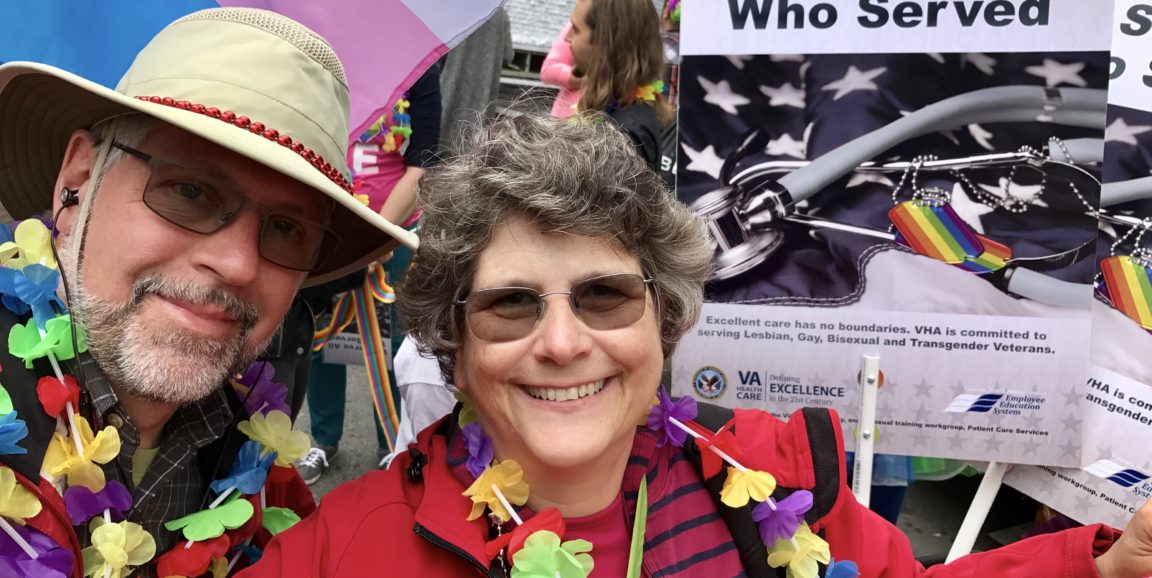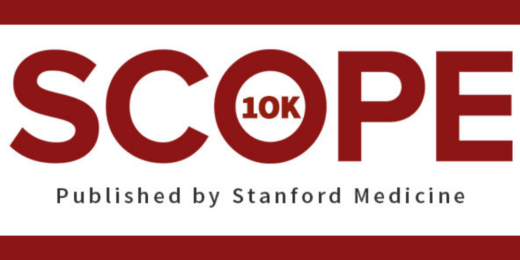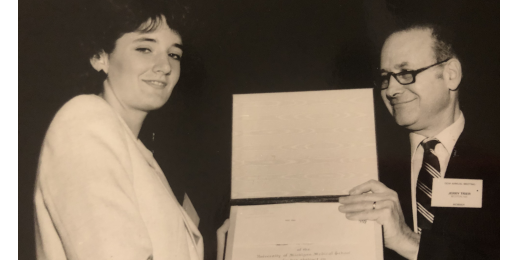My childhood was made immeasurably happier because of our gay neighbors. They taught me the importance of being together; they knew how to enjoy the moment. I learned to laugh so hard that laughing became indistinguishable from spasmodic gasps. They welcomed me, loved me, and made me, a pathologically shy and quiet child, feel comfortable and accepted.
My early childhood was the 1960s -- flower power, the Beatles, the assassinations of John F. Kennedy and Martin Luther King Jr., the civil rights movement, and the Vietnam War.
I grew up in Philadelphia; my sister and I were raised by our mother, an artist, in a financially poor, culturally rich manner. Our electricity and phone would sometimes be turned off. At age 8, I started stuffing envelopes to help bring in money. By the time I was 10, my sister and I began babysitting -- our earnings were used for food. But we were never homeless and never hungry. We lived in a very good neighborhood, in a fourth floor rowhouse walk-up.
In the apartments beneath us, next door and around the neighborhood, lived gay men in ever changing combinations and permutations. They loved life -- opera, peonies, the Miss America Pageant, antique furniture. They treasured a rose Judy Garland had touched at a concert they had attended. And they loved our little family. It was like having a half-dozen or so fun, childless uncles.
Holidays with the guys were special. Their Christmas trees were gorgeous -- thematically bedecked, the baubles crystalline and evenly distributed. Our tree had the homespun look: a preponderance of low hung ornaments of haphazard colors, clumped tinsel and other evidence of small hands at work. Their gift boxes shone; inside one crisply wrapped silver striped box was my first pair of stockings.
The guys on the floor below us had a TV -- we couldn't afford one. At the time of the moon landing, there we all were -- Dale, George, Freddy, Mel, Buddy, my mom, my sister and me -- crowded into the third floor front apartment, watching history in the middle of the night.
When one of them would hear our mom yelling from the stress of single parenting, and let's face, we weren't perfect kids, he would call, let the phone ring twice, hang up and call back. It was their code that is was one of them, not a bill collector or stranger. Our mom would answer, and soon forget to yell at us while she laughed at their stories.
Years later, when my sister's prom date came to our apartment to pick her up -- my sister looked as elegant as Grace Kelly in the dress sewn by our mom -- the gay guys lined the stairwell. The poor boy, adorned in a frilled yellow sateen shirt and shiny electric blue suit, had to pass all of them on the long four flights of stairs. I loved watching him go from a swagger to clutching the bannister for moral support as he neared our door at the top of the stairs. The guys, my mom, and I had an excellent laugh at his expense after the young couple left.
I also witnessed the ugly side of homophobia. At one New Year's Day Mummers Parade, an event where Philadelphians watch feathered, sequined strutters, (oddly, not openly gay) and listen to marching string bands play "O Dem Golden Slippers," the police subdued the carousing of our neighbors, who were doing their own strutting on the steps of the Academy of Music. Our friends were arrested as bystanders taunted them with epithets.
Over a decade later they were caught up in another history -- the deadly early years of the AIDS epidemic. I was 3,000 miles away attending Stanford medical school; by the time I was back in Philadelphia, our friends had died or moved away.
Now, as a physician, I hope I model sensitivity to and acceptance of our patients who identify as LGBTQ, as well as their partners and friends who are there to support their loved one at a critical time.
I stand as an ally of LGBTQ-Meds, Stanford Medicine's chapter of the Medical Student Pride Alliance, which supports, promotes and advocates for social justice, health and well-being of all lesbian, gay, bisexual, transgender, and queer people. I'm an ally, not only because it's the right thing to do and because I admire the amazing students, faculty, staff, patients and community members who align themselves with Pride. But I am also an ally to honor the memory of the gay men who filled my childhood with light, with love, and with laughter.
Audrey Shafer, MD, is professor of anesthesiology, perioperative and pain medicine at the Stanford University School of Medicine and the Veterans Affairs Palo Alto Health Care System; founder and director of the Medicine & the Muse Program at the Stanford Center for Biomedical Ethics; co-director of the Biomedical Ethics and Medical Humanities Scholarly Concentration; and co-founder of Pegasus Physician Writers and The Pegasus Review.
This piece is part of Scope@10,000, a series of original narrative essays from writers, physicians and thinkers in honor of Stanford Medicine's Scope blog publishing 10,000 posts. Stay tuned for more in the coming months.
Photo of Audrey Shafer and her husband in the 2017 San Francisco Pride Parade, courtesy of Audrey Shafer






